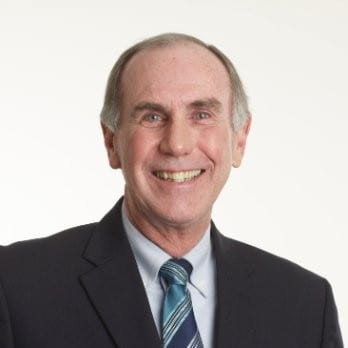Dan O’Leary entered the aging services field by happenstance nearly 50 years ago. He was fresh out of school with a bachelor’s degree in political science and a master’s in international relations. Facing a tight job market in the Boston area, he responded to a “postage-stamp sized job posting in the Boston Globe,” and went to work for an agency based in Roslindale that transported older adults.
The work, as he tells graduate students in the Management of Aging Services class he teaches for UMass Boston, grew on him so much that he never left the field.
“The job was rewarding in the sense that I was working with a group of people on mission-related work. It wasn’t about making a profit or competing or defeating some other company. It was about helping people, but also working at a strategic level,” O’Leary says. “I got to literally help people on and off the van and get them to daycare, then I’d go back to the office and try to figure out how to do this bigger and better.”
“Over the years, people have said, ‘Didn’t you kind of waste your time with your college degree?’ I tell them that the older I got, the more I realized that the art of diplomacy and human relations, and learning to negotiate with people, are universal skills.”
Eight years and two agencies later, O’Leary became director of Mystic Valley Elder Services (MVES) in 1982. The nonprofit, which now serves 11 cities and towns in the Massachusetts’ Mystic Valley region, works to ensure that older adults and adults with disabilities have the support they need, from transportation to at-home care to nutrition and other counseling services. O’Leary directed MVES for almost 10 years, left to direct the state’s Alzheimer’s Association chapter, and returned to MVES as its director from 1998 until his retirement in 2021.
As UMass Boston, O’Leary teaches human resources and personnel management, a required course in the Management of Aging Services master’s program. “The goal of the course is not to have the students become HR directors. It’s really about helping them do a better job of managing people,” he says. “I tell students, ‘You’re going to learn some things you can apply right now, at work or in daily life, about interacting with people and motivating people. Ultimately, very few of us work independently. Some people think they do, but the reality is you’re always interacting with others.”
At the top of the list for good management skills, he says, is listening. “You have to be an active listener if you want to communicate effectively.” Secondly, “hire the right people to do the work you need to accomplish, and treat them as assets.”
Treating employees well is one of O’Leary’s priorities. “Companies need to be equally aware of celebrating people who have found their ideal job—and it may not be as managers. We have to be just as aware of maintenance and lawn service workers and nursing assistants, so they feel valued and respected as part of the team and understand they’ve found their ideal job.” With the current high demand for positions such as bus drivers and nursing assistants a “massive problem” in the aging services field, treating front-line workers well becomes even more crucial, he says.
O’Leary has taught in the MAS program for 18 years, almost since it began. In the first few years he taught the class on campus on Saturday mornings. The program soon moved online for the convenience of working professionals, which made the transition to the COVID-19 pandemic fairly seamless for the faculty and students.
He enjoys the age, racial, and ethnic diversity of his students and their life experiences. He remembers one woman who enrolled in the program, then—right before the semester started—she moved to Manila to care for her mother. “She was a fantastic student. Our class was Wednesday nights at 7 pm, which was early Thursday mornings for her, but she showed up for every class.” Another student was stationed in Stuttgart, Germany, and showed up for the class, at 10 a.m. their time.
“Dan is passionate about serving older adults and committed to sharing his wealth of knowledge with our students, to make the world a better place for older adults,” says Ellen Birchander, MS, director of the MAS program. “He is kind and caring, and he gives his all to our students to ensure their success.”
While he enjoys teaching the management class, O’Leary has no regrets about finally stepping down from his CEO post, even though it was work that he loved and a mission he embraced. Especially with two young grandsons, he says, “retirement is great.”
–
The award-winning Management of Aging Services master’s program at UMass Boston, part of the second oldest graduate gerontology department in the world, is celebrating its 20th anniversary in 2023. The flexible, fully online program allows students to pursue a master’s degree at their own pace. Working professionals as well as newcomers to the fast-growing field of aging services will gain practical skills and relevant perspective from faculty with rich experience in the field.


Leave a Reply